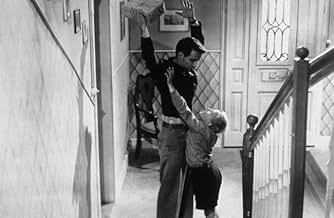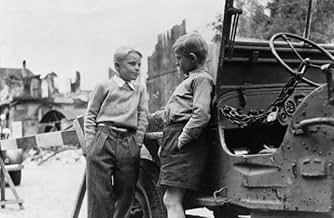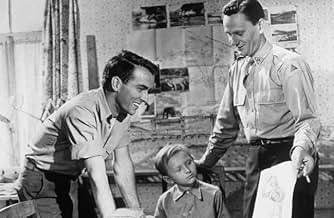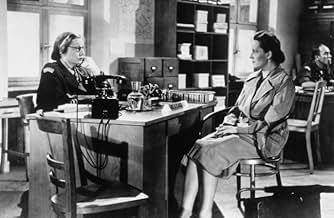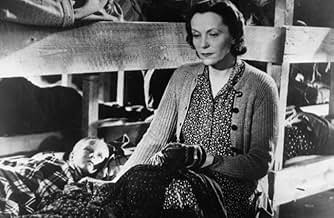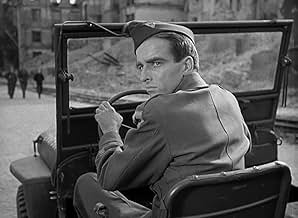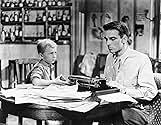IMDb RATING
7.8/10
5.2K
YOUR RATING
In post-war Berlin, an American private helps a lost Czech boy find his mother.In post-war Berlin, an American private helps a lost Czech boy find his mother.In post-war Berlin, an American private helps a lost Czech boy find his mother.
- Won 1 Oscar
- 7 wins & 7 nominations total
Featured reviews
10lugonian
THE SEARCH (Metro-Goldwyn-Mayer, 1948), directed by Fred Zinnemann, as mentioned after the opening credits, was produced in Switzerland and in the United States occupied zone of Germany through the permission of the United States Army and through the cooperation of the I.R.O. It was the first postwar movie to be filmed in an occupied zone. Looking at the background of destroyed buildings and broken streets, it's just a crucial reminder of the suffering amongst those European families and how horrible a war can be. Currently shown on Turner Classic Movies and once available on video, it's become one of the most requested from viewers, and rightfully so. Running at 105 minutes, there isn't a single frame wasted in the story, no scenes are unnecessary.
The plot in brief: Set in post World War II, a war orphan (Ivan Jandl, in his only movie role) is sheltered by an American G.I. (Montgomery Clift), while all that time, his mother (Jarmila Novotna), who has survived the hardship of the concentration camp, searches for him, knowing in her heart, that he is very much alive. And when the G.I. decides he wants to take the boy he calls "Jim" back with him to America, suspense builds for the viewers knowing that the mother is not that far away, and how they nearly miss each other in a couple of scenes. Aside from this being Clift's first movie to be released and his second film role, and that Ivan Jandl as Karel will steal one's heart, especially with his sad face, Aline MacMahon (1899-1991), as Deborah H. Murray, superintendent of the orphanage for war orphans, as well as the off screen narrator, gives possibly the best dramatic performance of her career, so sincere and natural, especially her devotion to those other children, one forgets that she's just an actress playing a role. Even her somewhat sad face adds to her personality and character. I only wished she had won, or at least been nominated, for an Academy Award for Best Supporting Actress for this performance. She deserved it. Clift, whose gun chewing soldier character comes about 45 minutes into the movie, also gives a sincere performance, and was nominated for Best Actor. Wendall Corey appears in support as Clift's Army buddy, Jerry Fisher.
I rank THE SEARCH one of director Zimmermann's most admired films, and one I never get tired of seeing whenever it's shown. Thank goodness TCM avoids showing the colorized version of THE SEARCH. Be sure to have your tissue box handy. (****)
The plot in brief: Set in post World War II, a war orphan (Ivan Jandl, in his only movie role) is sheltered by an American G.I. (Montgomery Clift), while all that time, his mother (Jarmila Novotna), who has survived the hardship of the concentration camp, searches for him, knowing in her heart, that he is very much alive. And when the G.I. decides he wants to take the boy he calls "Jim" back with him to America, suspense builds for the viewers knowing that the mother is not that far away, and how they nearly miss each other in a couple of scenes. Aside from this being Clift's first movie to be released and his second film role, and that Ivan Jandl as Karel will steal one's heart, especially with his sad face, Aline MacMahon (1899-1991), as Deborah H. Murray, superintendent of the orphanage for war orphans, as well as the off screen narrator, gives possibly the best dramatic performance of her career, so sincere and natural, especially her devotion to those other children, one forgets that she's just an actress playing a role. Even her somewhat sad face adds to her personality and character. I only wished she had won, or at least been nominated, for an Academy Award for Best Supporting Actress for this performance. She deserved it. Clift, whose gun chewing soldier character comes about 45 minutes into the movie, also gives a sincere performance, and was nominated for Best Actor. Wendall Corey appears in support as Clift's Army buddy, Jerry Fisher.
I rank THE SEARCH one of director Zimmermann's most admired films, and one I never get tired of seeing whenever it's shown. Thank goodness TCM avoids showing the colorized version of THE SEARCH. Be sure to have your tissue box handy. (****)
MONTGOMERY CLIFT is the nominal star of THE SEARCH but it's little Ivan Jandl that audiences were likely to remember after watching this spellbinding story of his plight as a victim of war amid separation from his mother. Clift is firmly in command of his role as a compassionate soldier who takes the boy under his wing and teaches him to communicate in English. Wendell Corey is excellent as a soldier friend of Clift and opera singer Jarmila Novotna is totally convincing as the boy's mother intent on being reunited with her son.
Another pivotal role is filled brilliantly by ALINE MacMAHON in a part that surely deserved an award nomination. At any rate, Clift deserved his nomination as Best Actor and Ivan Jandl fully deserved his special Oscar as the juvenile lead. His facial expression and eyes tell the whole story without a single bit of dialogue. The only other child actor I can compare him with (at that time) is Claude Jarman, Jr. who showed a natural skill for performing at a tender age.
The impact of the devastation of war on ruined buildings is caught by the camera vividly in on location footage shot in Germany under Fred Zinnemann's expert direction. But it's the impact of war on the very young children that is the focus of this film and to that end it succeeds brilliantly in capturing the grief and loneliness of all those victims of war in a way that is sure to stir your emotions.
Summing up: gritty post-war film, honest emotionally and powerful in its presentation. Highly recommended.
Another pivotal role is filled brilliantly by ALINE MacMAHON in a part that surely deserved an award nomination. At any rate, Clift deserved his nomination as Best Actor and Ivan Jandl fully deserved his special Oscar as the juvenile lead. His facial expression and eyes tell the whole story without a single bit of dialogue. The only other child actor I can compare him with (at that time) is Claude Jarman, Jr. who showed a natural skill for performing at a tender age.
The impact of the devastation of war on ruined buildings is caught by the camera vividly in on location footage shot in Germany under Fred Zinnemann's expert direction. But it's the impact of war on the very young children that is the focus of this film and to that end it succeeds brilliantly in capturing the grief and loneliness of all those victims of war in a way that is sure to stir your emotions.
Summing up: gritty post-war film, honest emotionally and powerful in its presentation. Highly recommended.
Enjoyed this film from beginning to the very end because of a great story about children who were separated from their parents by Nazi Germany and they were also placed in concentration camps and marked with a number like cattle. Montgomery Clift, (Steve Stevenson) plays the role as an Army personnel who finds a very young boy who is starving and gives him some of his lunch. This young boy is named Karel Malik, (Ivan Jandl) who learns to speak English from Steve and starts to forget some of his horrible experiences. However, Karel begins to want to find his mother who is Mrs. Hannah Malik and Hannah is searching all through the ruins of bombed out towns trying to find her son. There is great acting by Montgomery Clift and Wendell Corey and this is a horrible story about the effects Hitler had on young children, men and women who were treated like animals. Great Gem of a Film !.
I love the old WWII movies and how they portray what life was like for the men and women who served - and what it was like for the families etc. But of all the ones I've seen, I don't think I've seen a single one that highlighted the plight of the children. I'm glad this one chose to bring this sad effect of war to the public in this film.
The movie starts more like a documentary with a female narrator telling part of the story. At times the narration is a little annoying. But most of the rest of the film unfolds naturally without the narration. The film is a heartbreaking tale of the orphaned children of the war. They have nowhere to go and are shuttled from orphanages to resettlement centers. I was so shocked when I first saw the children - they looked so emaciated and dirty. They all seemed to have shell-shocked expressions on their faces. I think the director (Fred Zinneman)did a great job of casting and going for a realistic portrayal and not trying to gloss over the true realities. Being of Austrian Jewish heritage, the story no doubt hit close to home for him.
The actual location shooting in bombed out cities of Germany was also quite stark and realistic. I'm glad they chose not to try to replicate the devastation in a studio. Being filmed in 1948, 3 years after the end of the war - I was shocked to see how much destruction was still evident, with huge piles of rubble laying around. The cities looked deserted.
This was one of Montgomery Clift's first films. He doesn't appear until 36 minutes into film. He delivers a fine performance given his inexperience (although he was experienced on the stage). He is still in possession of his youthful good looks which deteriorated later. Too bad he lived such a young, tragic life as he was quite a natural talent. The young boy is quite a good actor for his age and manages to express his desperation through his body language and action since he doesn't speak for almost 2/3's of the film.
There are many memorable and shocking scenes: the drowning of one of the children, the young boy searching through a crowd of women for his mom, several scenes of his wild and desperate attempts to escape at all costs, and the hordes of children exiting from the train as they arrive at the settlement center. Many of these scenes are some I will never forget.
I'm shocked so few people have seen this (given only 37 comments and 1000+votes on IMDb at this time). I highly recommend this film if you are interested in movies about the sad effects of war.
The movie starts more like a documentary with a female narrator telling part of the story. At times the narration is a little annoying. But most of the rest of the film unfolds naturally without the narration. The film is a heartbreaking tale of the orphaned children of the war. They have nowhere to go and are shuttled from orphanages to resettlement centers. I was so shocked when I first saw the children - they looked so emaciated and dirty. They all seemed to have shell-shocked expressions on their faces. I think the director (Fred Zinneman)did a great job of casting and going for a realistic portrayal and not trying to gloss over the true realities. Being of Austrian Jewish heritage, the story no doubt hit close to home for him.
The actual location shooting in bombed out cities of Germany was also quite stark and realistic. I'm glad they chose not to try to replicate the devastation in a studio. Being filmed in 1948, 3 years after the end of the war - I was shocked to see how much destruction was still evident, with huge piles of rubble laying around. The cities looked deserted.
This was one of Montgomery Clift's first films. He doesn't appear until 36 minutes into film. He delivers a fine performance given his inexperience (although he was experienced on the stage). He is still in possession of his youthful good looks which deteriorated later. Too bad he lived such a young, tragic life as he was quite a natural talent. The young boy is quite a good actor for his age and manages to express his desperation through his body language and action since he doesn't speak for almost 2/3's of the film.
There are many memorable and shocking scenes: the drowning of one of the children, the young boy searching through a crowd of women for his mom, several scenes of his wild and desperate attempts to escape at all costs, and the hordes of children exiting from the train as they arrive at the settlement center. Many of these scenes are some I will never forget.
I'm shocked so few people have seen this (given only 37 comments and 1000+votes on IMDb at this time). I highly recommend this film if you are interested in movies about the sad effects of war.
Aside from some dated music and ponderous narration, this is a nearly perfect film. It's surprising, then, that people rarely talk about this being among Montgoery Clift's best work. I, for one, prefer this over From Here to Eternity, Raintree County or even The Heiress. This is because I rarely have encountered a movie that has so pulled me in emotionally to the story. I'm a guy and I don't just start bawling at everything, but I defy ANY person to watch this film with a dry eye! It just doesn't seem possible.
The story is less about G.I. Clift than about a sad but adorable little boy he encounters wandering around in post-war Germany. At first, the boy is wild and doesn't trust anyone, as he and his family had been through the holocaust. Somehow in the concentration camp, he and his mother had become separated and at the end of the war, he had run away from the allied resettlement program because he had a natural fear of ALL soldiers. Despite these tragedies, the boy did not give up hope of one day finding his mother, though Clift plans on taking him back to the States because he knows it is hopeless to go on searching.
You've GOT to see this film! You've GOT to show it to your kids! Although the Diary of Ann Frank and Shindler's List have received a lot of attention, this little film is every bit as poignant and important for understanding the real impact of World War II.
The story is less about G.I. Clift than about a sad but adorable little boy he encounters wandering around in post-war Germany. At first, the boy is wild and doesn't trust anyone, as he and his family had been through the holocaust. Somehow in the concentration camp, he and his mother had become separated and at the end of the war, he had run away from the allied resettlement program because he had a natural fear of ALL soldiers. Despite these tragedies, the boy did not give up hope of one day finding his mother, though Clift plans on taking him back to the States because he knows it is hopeless to go on searching.
You've GOT to see this film! You've GOT to show it to your kids! Although the Diary of Ann Frank and Shindler's List have received a lot of attention, this little film is every bit as poignant and important for understanding the real impact of World War II.
Did you know
- TriviaBen Mankiewicz on TCM indicated that Ivan Jandl spoke no English at the time this film was made, and that his English dialogue was phonetically memorized.
- GoofsOn Montgomery Clift's right shoulder, he wears the patch of the 102nd infantry division, but it is sewed on incorrectly; it is turned 90 degrees to the right.
- Quotes
[Steve is teaching a young boy, whose name he does not know but has coined Jim, to speak English]
Ralph 'Steve' Stevenson: [to Jim] You have no idea how useful it's going to be for you to know English. You can go where ever you like. Everybody knows what 'OK' means. You can use English all over the world. Not, not just America: Canada, Africa, Australia, India. Even in England, they understand English... well, sort of.
- Alternate versionsThere is an Italian edition of this film on DVD, distributed by DNA srl, "LA SETTIMA CROCE (1944) + THE SEARCH (Odissea tragica, 1948)" (2 Films on a single DVD), re-edited with the contribution of film historian Riccardo Cusin. This version is also available for streaming on some platforms.
- ConnectionsFeatured in Hollywood et la Shoah (2004)
- How long is The Search?Powered by Alexa
Details
Box office
- Budget
- $250,000 (estimated)
- Runtime1 hour 44 minutes
- Color
- Sound mix
- Aspect ratio
- 1.37 : 1
Contribute to this page
Suggest an edit or add missing content



